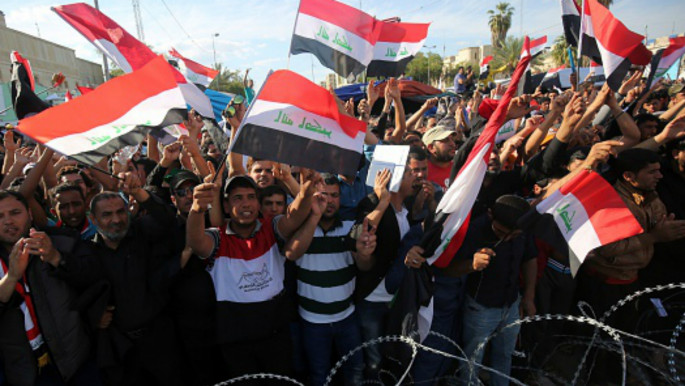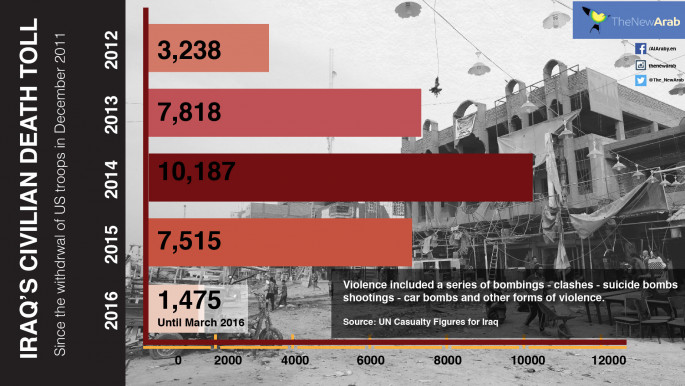Iraqi parliament cancels session as crisis reaches boiling point
Earlier, a number of MPs voted to replace him.
Salim al-Juburi called for the session to be postponed until the parliament building, located inside Baghdad's fortified Green Zone, was thoroughly inspected for security reasons.
"Juburi requested from Iraqi forces to inspect the building for explosives and bombs and to check that lawmakers attending parliament were unarmed," a source close to the parliament speaker told The New Arab.
The session was the third cancelled this week over political disputes about a plan to have the current cabinet of party-affiliated ministers replaced by a technocratic government.
 |
Two pervious parliamentary sessions earlier this week ended in sit-in protests and fistfights between MPs. |  |
Intractable crisis
President Haider al-Abadi had submitted a list of ministerial nominees but powerful political parties fear that new appointments will weaken their political patronage networks as well as limit their cash-flow and influence.
Failing to reach a consent over moving forward with the vote on a new cabinet, lawmakers held a ballot to sack the parliament speaker and his deputies on Thursday.
| Some Iraqi MPs stage a protest demanding a technocrat government [Anadolu] |
They claim they had a majority in the assembly but parliament speaker Juburi called his sacking invalid, citing lack of quorum.
Two pervious parliamentary sessions earlier this week ended in sit-in protests and fistfights between MPs.
The call for a new cabinet followed widespread popular anger and street protests that condemned corruption many see endemic in the Iraqi government.
Cabinet ministers representing different political blocs are widely considered to be fomenting corrupt practices to favour their own political parties.
Protests outside the Green Zone, where many of the Iraqi government's main institutions are located, were called for by Shia cleric Muqatada al-Sadr demanding reform of the government.
Sadr, who arrived in the Lebanese capital Beirut on Thursday to discuss the political crisis, had threatened the government that his supporters would storm the Green Zone if reform measures were not passed and rampant corruption was not controlled.
 |
The UN warned on Friday that the deepening political turmoil in Iraq may threaten the country's war on IS. |  |
Washington weighs in
 |
| Supporters of Moqtada al-Sadr wave their national flag as they protest outside the heavily fortified Green Zone in Baghdad [Getty] |
Meanwhile, Washington expressed concern that the political disputes will hamper efforts to combat Islamic State [IS] group militants in Iraq.
Iraqi forces continue in their battle to retake more ground from IS militants, who in 2014 captured large areas north and west of Baghdad.
Military reinforcements headed on Saturday towards the besieged city of Fallujah, where the battle to recapture the city from IS militants enters a critical stage.
"The Iraqi government sent military reinforcements to the areas surrounding the city," army brigade commander Jumaa al-Jameli told The New Arab.
"These included fighters from the army and security forces as well as tanks and armoured vehicles," Jameli added.
"The reinforcements were deployed around the city in preparation for its liberation, which we anticipate to take place in the next few days," Jameli said.
The UN also warned on Friday that the deepening political turmoil in Iraq may threaten the country's war on IS.
 |
The UN warned on Friday that the deepening political turmoil in Iraq may threaten the country's war on IS |  |
"The only party that benefits from the political divisons and chaos as well as the weakening of the state and its institutions is Daesh," the acting head of the UN Iraq mission Gyorgy Busztin said, using the Arabic acronym for IS, "We should not allow this to happen."
"The political leaders of Iraq should place the high national interest over any other consideration and work relentlessly to ensure the political process produces solutions that would lead Iraq out of its crisis and strengthen the state and its institutions," Busztin urged.
Iraqi forces recaptured significant ground from IS, but the militants still control a large area of western Iraq and often carry out frequent bombings in government-held areas.
 |





 Follow the Middle East's top stories in English at The New Arab on Google News
Follow the Middle East's top stories in English at The New Arab on Google News
![Both Hamas and the Palestinian Authority welcomed the ICC arrest warrants [Getty]](/sites/default/files/styles/image_330x185/public/2024-11/GettyImages-2178351173.jpg?h=199d8c1f&itok=TV858iVg)

